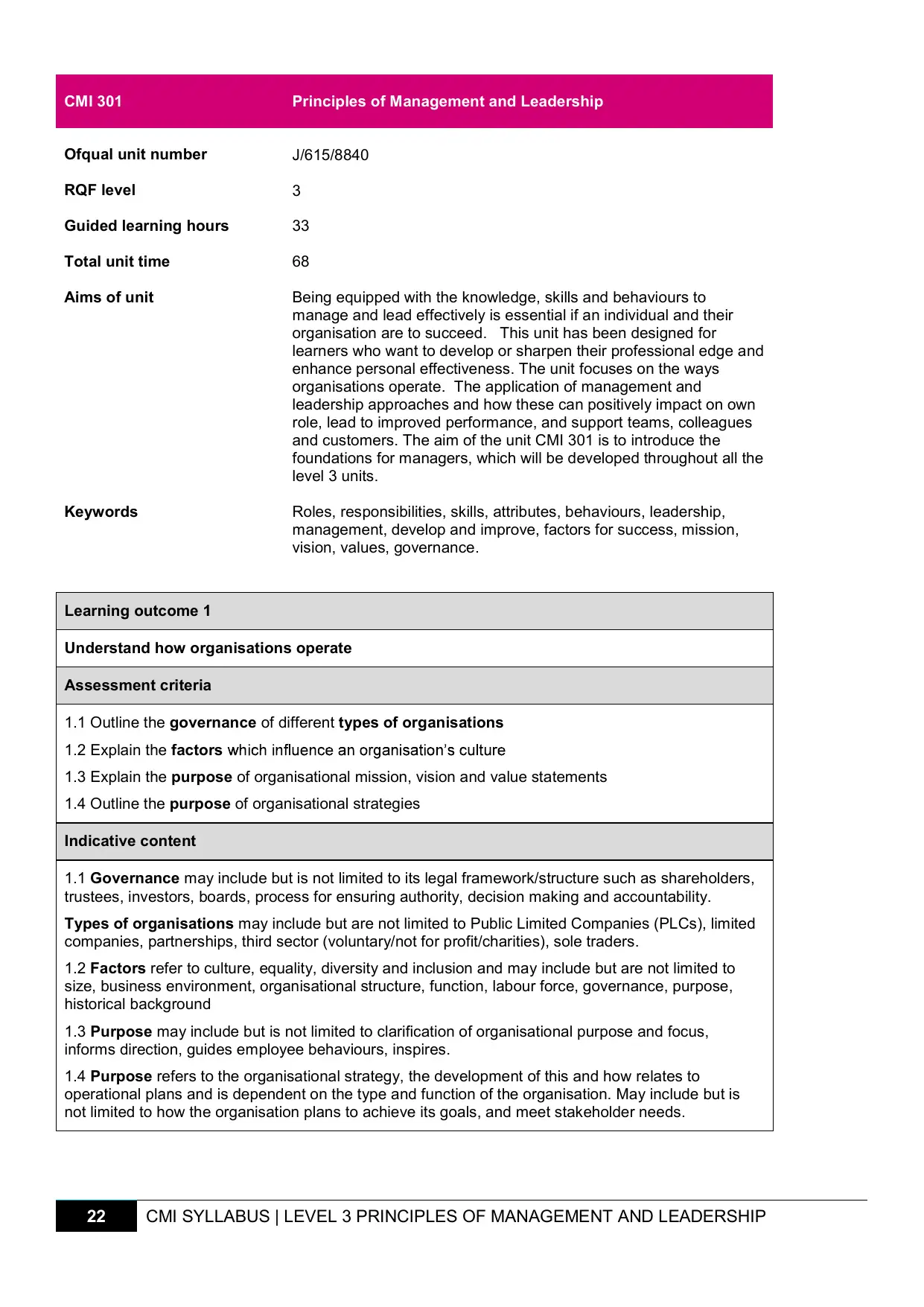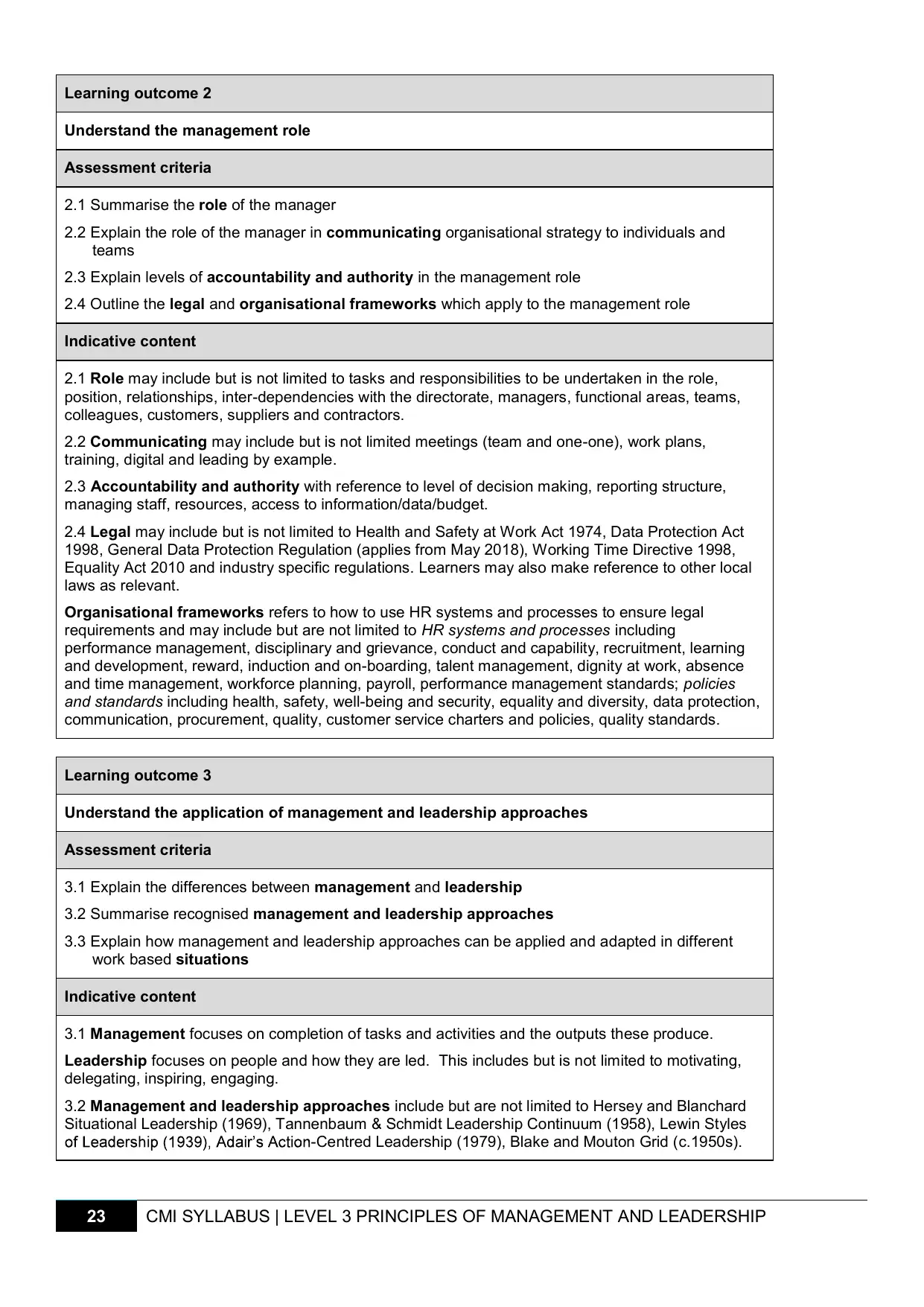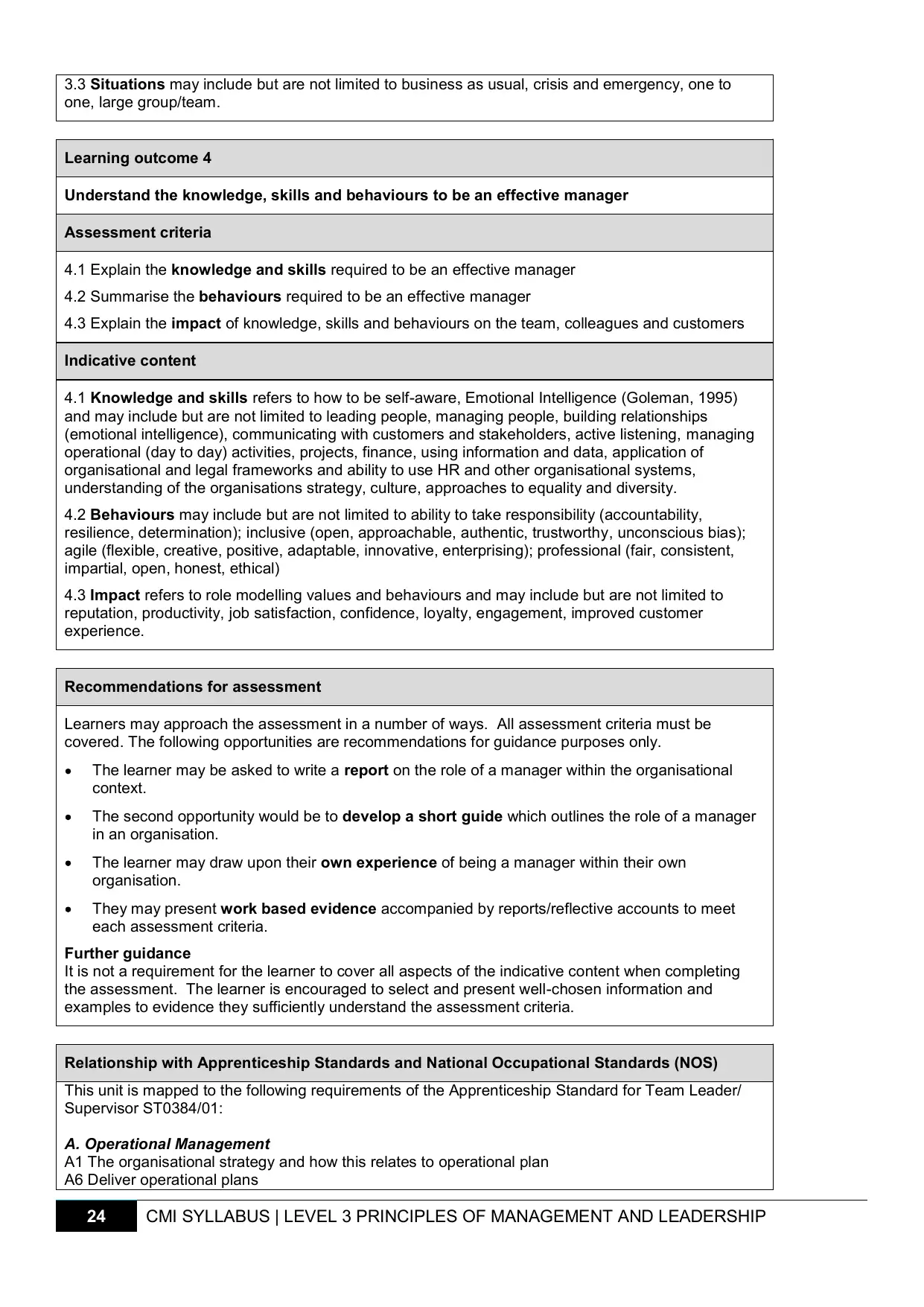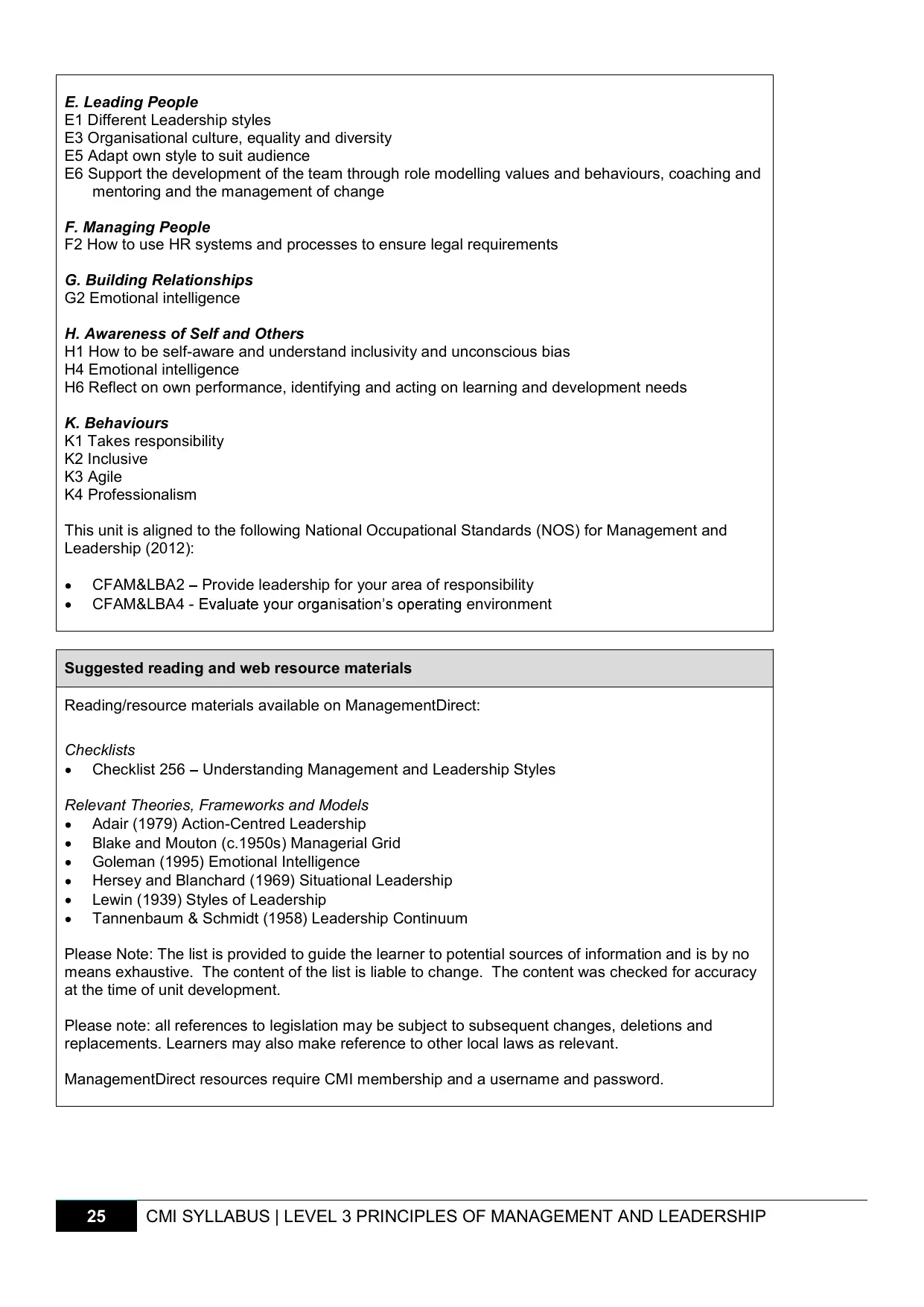CMI 301: Principles of Management and Leadership Report - Level 3
VerifiedAdded on 2021/03/03
|4
|1653
|850
Report
AI Summary
This report provides a detailed analysis of the CMI 301 Principles of Management and Leadership unit. It covers key learning outcomes, including understanding how organizations operate, the management role, the application of management and leadership approaches, and the knowledge, skills, and behaviors required for effective management. The report outlines the governance of different types of organizations, factors influencing organizational success, and the purpose of mission, vision, and value statements. It explores the role of a manager, including communication strategies, accountability, and legal and organizational frameworks. Furthermore, it differentiates between management and leadership, summarizes recognized approaches, and explains how these approaches can be applied in various work-based situations. Finally, the report details the knowledge, skills, and behaviors essential for an effective manager and explains their impact on teams, colleagues, and customers. The report aligns with apprenticeship standards and national occupational standards, providing a comprehensive overview of the subject matter.

22 CMI SYLLABUS | LEVEL 3 PRINCIPLES OF MANAGEMENT AND LEADERSHIP
CMI 301 Principles of Management and Leadership
Ofqual unit number J/615/8840
RQF level 3
Guided learning hours 33
Total unit time 68
Aims of unit Being equipped with the knowledge, skills and behaviours to
manage and lead effectively is essential if an individual and their
organisation are to succeed. This unit has been designed for
learners who want to develop or sharpen their professional edge and
enhance personal effectiveness. The unit focuses on the ways
organisations operate. The application of management and
leadership approaches and how these can positively impact on own
role, lead to improved performance, and support teams, colleagues
and customers. The aim of the unit CMI 301 is to introduce the
foundations for managers, which will be developed throughout all the
level 3 units.
Keywords Roles, responsibilities, skills, attributes, behaviours, leadership,
management, develop and improve, factors for success, mission,
vision, values, governance.
Learning outcome 1
Understand how organisations operate
Assessment criteria
1.1 Outline the governance of different types of organisations
1.2 Explain the factors
1.3 Explain the purpose of organisational mission, vision and value statements
1.4 Outline the purpose of organisational strategies
Indicative content
1.1 Governance may include but is not limited to its legal framework/structure such as shareholders,
trustees, investors, boards, process for ensuring authority, decision making and accountability.
Types of organisations may include but are not limited to Public Limited Companies (PLCs), limited
companies, partnerships, third sector (voluntary/not for profit/charities), sole traders.
1.2 Factors refer to culture, equality, diversity and inclusion and may include but are not limited to
size, business environment, organisational structure, function, labour force, governance, purpose,
historical background
1.3 Purpose may include but is not limited to clarification of organisational purpose and focus,
informs direction, guides employee behaviours, inspires.
1.4 Purpose refers to the organisational strategy, the development of this and how relates to
operational plans and is dependent on the type and function of the organisation. May include but is
not limited to how the organisation plans to achieve its goals, and meet stakeholder needs.
CMI 301 Principles of Management and Leadership
Ofqual unit number J/615/8840
RQF level 3
Guided learning hours 33
Total unit time 68
Aims of unit Being equipped with the knowledge, skills and behaviours to
manage and lead effectively is essential if an individual and their
organisation are to succeed. This unit has been designed for
learners who want to develop or sharpen their professional edge and
enhance personal effectiveness. The unit focuses on the ways
organisations operate. The application of management and
leadership approaches and how these can positively impact on own
role, lead to improved performance, and support teams, colleagues
and customers. The aim of the unit CMI 301 is to introduce the
foundations for managers, which will be developed throughout all the
level 3 units.
Keywords Roles, responsibilities, skills, attributes, behaviours, leadership,
management, develop and improve, factors for success, mission,
vision, values, governance.
Learning outcome 1
Understand how organisations operate
Assessment criteria
1.1 Outline the governance of different types of organisations
1.2 Explain the factors
1.3 Explain the purpose of organisational mission, vision and value statements
1.4 Outline the purpose of organisational strategies
Indicative content
1.1 Governance may include but is not limited to its legal framework/structure such as shareholders,
trustees, investors, boards, process for ensuring authority, decision making and accountability.
Types of organisations may include but are not limited to Public Limited Companies (PLCs), limited
companies, partnerships, third sector (voluntary/not for profit/charities), sole traders.
1.2 Factors refer to culture, equality, diversity and inclusion and may include but are not limited to
size, business environment, organisational structure, function, labour force, governance, purpose,
historical background
1.3 Purpose may include but is not limited to clarification of organisational purpose and focus,
informs direction, guides employee behaviours, inspires.
1.4 Purpose refers to the organisational strategy, the development of this and how relates to
operational plans and is dependent on the type and function of the organisation. May include but is
not limited to how the organisation plans to achieve its goals, and meet stakeholder needs.
Paraphrase This Document
Need a fresh take? Get an instant paraphrase of this document with our AI Paraphraser

23 CMI SYLLABUS | LEVEL 3 PRINCIPLES OF MANAGEMENT AND LEADERSHIP
Learning outcome 2
Understand the management role
Assessment criteria
2.1 Summarise the role of the manager
2.2 Explain the role of the manager in communicating organisational strategy to individuals and
teams
2.3 Explain levels of accountability and authority in the management role
2.4 Outline the legal and organisational frameworks which apply to the management role
Indicative content
2.1 Role may include but is not limited to tasks and responsibilities to be undertaken in the role,
position, relationships, inter-dependencies with the directorate, managers, functional areas, teams,
colleagues, customers, suppliers and contractors.
2.2 Communicating may include but is not limited meetings (team and one-one), work plans,
training, digital and leading by example.
2.3 Accountability and authority with reference to level of decision making, reporting structure,
managing staff, resources, access to information/data/budget.
2.4 Legal may include but is not limited to Health and Safety at Work Act 1974, Data Protection Act
1998, General Data Protection Regulation (applies from May 2018), Working Time Directive 1998,
Equality Act 2010 and industry specific regulations. Learners may also make reference to other local
laws as relevant.
Organisational frameworks refers to how to use HR systems and processes to ensure legal
requirements and may include but are not limited to HR systems and processes including
performance management, disciplinary and grievance, conduct and capability, recruitment, learning
and development, reward, induction and on-boarding, talent management, dignity at work, absence
and time management, workforce planning, payroll, performance management standards; policies
and standards including health, safety, well-being and security, equality and diversity, data protection,
communication, procurement, quality, customer service charters and policies, quality standards.
Learning outcome 3
Understand the application of management and leadership approaches
Assessment criteria
3.1 Explain the differences between management and leadership
3.2 Summarise recognised management and leadership approaches
3.3 Explain how management and leadership approaches can be applied and adapted in different
work based situations
Indicative content
3.1 Management focuses on completion of tasks and activities and the outputs these produce.
Leadership focuses on people and how they are led. This includes but is not limited to motivating,
delegating, inspiring, engaging.
3.2 Management and leadership approaches include but are not limited to Hersey and Blanchard
Situational Leadership (1969), Tannenbaum & Schmidt Leadership Continuum (1958), Lewin Styles
-Centred Leadership (1979), Blake and Mouton Grid (c.1950s).
Learning outcome 2
Understand the management role
Assessment criteria
2.1 Summarise the role of the manager
2.2 Explain the role of the manager in communicating organisational strategy to individuals and
teams
2.3 Explain levels of accountability and authority in the management role
2.4 Outline the legal and organisational frameworks which apply to the management role
Indicative content
2.1 Role may include but is not limited to tasks and responsibilities to be undertaken in the role,
position, relationships, inter-dependencies with the directorate, managers, functional areas, teams,
colleagues, customers, suppliers and contractors.
2.2 Communicating may include but is not limited meetings (team and one-one), work plans,
training, digital and leading by example.
2.3 Accountability and authority with reference to level of decision making, reporting structure,
managing staff, resources, access to information/data/budget.
2.4 Legal may include but is not limited to Health and Safety at Work Act 1974, Data Protection Act
1998, General Data Protection Regulation (applies from May 2018), Working Time Directive 1998,
Equality Act 2010 and industry specific regulations. Learners may also make reference to other local
laws as relevant.
Organisational frameworks refers to how to use HR systems and processes to ensure legal
requirements and may include but are not limited to HR systems and processes including
performance management, disciplinary and grievance, conduct and capability, recruitment, learning
and development, reward, induction and on-boarding, talent management, dignity at work, absence
and time management, workforce planning, payroll, performance management standards; policies
and standards including health, safety, well-being and security, equality and diversity, data protection,
communication, procurement, quality, customer service charters and policies, quality standards.
Learning outcome 3
Understand the application of management and leadership approaches
Assessment criteria
3.1 Explain the differences between management and leadership
3.2 Summarise recognised management and leadership approaches
3.3 Explain how management and leadership approaches can be applied and adapted in different
work based situations
Indicative content
3.1 Management focuses on completion of tasks and activities and the outputs these produce.
Leadership focuses on people and how they are led. This includes but is not limited to motivating,
delegating, inspiring, engaging.
3.2 Management and leadership approaches include but are not limited to Hersey and Blanchard
Situational Leadership (1969), Tannenbaum & Schmidt Leadership Continuum (1958), Lewin Styles
-Centred Leadership (1979), Blake and Mouton Grid (c.1950s).

24 CMI SYLLABUS | LEVEL 3 PRINCIPLES OF MANAGEMENT AND LEADERSHIP
3.3 Situations may include but are not limited to business as usual, crisis and emergency, one to
one, large group/team.
Learning outcome 4
Understand the knowledge, skills and behaviours to be an effective manager
Assessment criteria
4.1 Explain the knowledge and skills required to be an effective manager
4.2 Summarise the behaviours required to be an effective manager
4.3 Explain the impact of knowledge, skills and behaviours on the team, colleagues and customers
Indicative content
4.1 Knowledge and skills refers to how to be self-aware, Emotional Intelligence (Goleman, 1995)
and may include but are not limited to leading people, managing people, building relationships
(emotional intelligence), communicating with customers and stakeholders, active listening, managing
operational (day to day) activities, projects, finance, using information and data, application of
organisational and legal frameworks and ability to use HR and other organisational systems,
understanding of the organisations strategy, culture, approaches to equality and diversity.
4.2 Behaviours may include but are not limited to ability to take responsibility (accountability,
resilience, determination); inclusive (open, approachable, authentic, trustworthy, unconscious bias);
agile (flexible, creative, positive, adaptable, innovative, enterprising); professional (fair, consistent,
impartial, open, honest, ethical)
4.3 Impact refers to role modelling values and behaviours and may include but are not limited to
reputation, productivity, job satisfaction, confidence, loyalty, engagement, improved customer
experience.
Recommendations for assessment
Learners may approach the assessment in a number of ways. All assessment criteria must be
covered. The following opportunities are recommendations for guidance purposes only.
The learner may be asked to write a report on the role of a manager within the organisational
context.
The second opportunity would be to develop a short guide which outlines the role of a manager
in an organisation.
The learner may draw upon their own experience of being a manager within their own
organisation.
They may present work based evidence accompanied by reports/reflective accounts to meet
each assessment criteria.
Further guidance
It is not a requirement for the learner to cover all aspects of the indicative content when completing
the assessment. The learner is encouraged to select and present well-chosen information and
examples to evidence they sufficiently understand the assessment criteria.
Relationship with Apprenticeship Standards and National Occupational Standards (NOS)
This unit is mapped to the following requirements of the Apprenticeship Standard for Team Leader/
Supervisor ST0384/01:
A. Operational Management
A1 The organisational strategy and how this relates to operational plan
A6 Deliver operational plans
3.3 Situations may include but are not limited to business as usual, crisis and emergency, one to
one, large group/team.
Learning outcome 4
Understand the knowledge, skills and behaviours to be an effective manager
Assessment criteria
4.1 Explain the knowledge and skills required to be an effective manager
4.2 Summarise the behaviours required to be an effective manager
4.3 Explain the impact of knowledge, skills and behaviours on the team, colleagues and customers
Indicative content
4.1 Knowledge and skills refers to how to be self-aware, Emotional Intelligence (Goleman, 1995)
and may include but are not limited to leading people, managing people, building relationships
(emotional intelligence), communicating with customers and stakeholders, active listening, managing
operational (day to day) activities, projects, finance, using information and data, application of
organisational and legal frameworks and ability to use HR and other organisational systems,
understanding of the organisations strategy, culture, approaches to equality and diversity.
4.2 Behaviours may include but are not limited to ability to take responsibility (accountability,
resilience, determination); inclusive (open, approachable, authentic, trustworthy, unconscious bias);
agile (flexible, creative, positive, adaptable, innovative, enterprising); professional (fair, consistent,
impartial, open, honest, ethical)
4.3 Impact refers to role modelling values and behaviours and may include but are not limited to
reputation, productivity, job satisfaction, confidence, loyalty, engagement, improved customer
experience.
Recommendations for assessment
Learners may approach the assessment in a number of ways. All assessment criteria must be
covered. The following opportunities are recommendations for guidance purposes only.
The learner may be asked to write a report on the role of a manager within the organisational
context.
The second opportunity would be to develop a short guide which outlines the role of a manager
in an organisation.
The learner may draw upon their own experience of being a manager within their own
organisation.
They may present work based evidence accompanied by reports/reflective accounts to meet
each assessment criteria.
Further guidance
It is not a requirement for the learner to cover all aspects of the indicative content when completing
the assessment. The learner is encouraged to select and present well-chosen information and
examples to evidence they sufficiently understand the assessment criteria.
Relationship with Apprenticeship Standards and National Occupational Standards (NOS)
This unit is mapped to the following requirements of the Apprenticeship Standard for Team Leader/
Supervisor ST0384/01:
A. Operational Management
A1 The organisational strategy and how this relates to operational plan
A6 Deliver operational plans
⊘ This is a preview!⊘
Do you want full access?
Subscribe today to unlock all pages.

Trusted by 1+ million students worldwide

25 CMI SYLLABUS | LEVEL 3 PRINCIPLES OF MANAGEMENT AND LEADERSHIP
E. Leading People
E1 Different Leadership styles
E3 Organisational culture, equality and diversity
E5 Adapt own style to suit audience
E6 Support the development of the team through role modelling values and behaviours, coaching and
mentoring and the management of change
F. Managing People
F2 How to use HR systems and processes to ensure legal requirements
G. Building Relationships
G2 Emotional intelligence
H. Awareness of Self and Others
H1 How to be self-aware and understand inclusivity and unconscious bias
H4 Emotional intelligence
H6 Reflect on own performance, identifying and acting on learning and development needs
K. Behaviours
K1 Takes responsibility
K2 Inclusive
K3 Agile
K4 Professionalism
This unit is aligned to the following National Occupational Standards (NOS) for Management and
Leadership (2012):
CFAM&LBA2 Provide leadership for your area of responsibility
CFAM&LBA4 - environment
Suggested reading and web resource materials
Reading/resource materials available on ManagementDirect:
Checklists
Checklist 256 Understanding Management and Leadership Styles
Relevant Theories, Frameworks and Models
Adair (1979) Action-Centred Leadership
Blake and Mouton (c.1950s) Managerial Grid
Goleman (1995) Emotional Intelligence
Hersey and Blanchard (1969) Situational Leadership
Lewin (1939) Styles of Leadership
Tannenbaum & Schmidt (1958) Leadership Continuum
Please Note: The list is provided to guide the learner to potential sources of information and is by no
means exhaustive. The content of the list is liable to change. The content was checked for accuracy
at the time of unit development.
Please note: all references to legislation may be subject to subsequent changes, deletions and
replacements. Learners may also make reference to other local laws as relevant.
ManagementDirect resources require CMI membership and a username and password.
E. Leading People
E1 Different Leadership styles
E3 Organisational culture, equality and diversity
E5 Adapt own style to suit audience
E6 Support the development of the team through role modelling values and behaviours, coaching and
mentoring and the management of change
F. Managing People
F2 How to use HR systems and processes to ensure legal requirements
G. Building Relationships
G2 Emotional intelligence
H. Awareness of Self and Others
H1 How to be self-aware and understand inclusivity and unconscious bias
H4 Emotional intelligence
H6 Reflect on own performance, identifying and acting on learning and development needs
K. Behaviours
K1 Takes responsibility
K2 Inclusive
K3 Agile
K4 Professionalism
This unit is aligned to the following National Occupational Standards (NOS) for Management and
Leadership (2012):
CFAM&LBA2 Provide leadership for your area of responsibility
CFAM&LBA4 - environment
Suggested reading and web resource materials
Reading/resource materials available on ManagementDirect:
Checklists
Checklist 256 Understanding Management and Leadership Styles
Relevant Theories, Frameworks and Models
Adair (1979) Action-Centred Leadership
Blake and Mouton (c.1950s) Managerial Grid
Goleman (1995) Emotional Intelligence
Hersey and Blanchard (1969) Situational Leadership
Lewin (1939) Styles of Leadership
Tannenbaum & Schmidt (1958) Leadership Continuum
Please Note: The list is provided to guide the learner to potential sources of information and is by no
means exhaustive. The content of the list is liable to change. The content was checked for accuracy
at the time of unit development.
Please note: all references to legislation may be subject to subsequent changes, deletions and
replacements. Learners may also make reference to other local laws as relevant.
ManagementDirect resources require CMI membership and a username and password.
1 out of 4
Related Documents
Your All-in-One AI-Powered Toolkit for Academic Success.
+13062052269
info@desklib.com
Available 24*7 on WhatsApp / Email
![[object Object]](/_next/static/media/star-bottom.7253800d.svg)
Unlock your academic potential
Copyright © 2020–2026 A2Z Services. All Rights Reserved. Developed and managed by ZUCOL.





